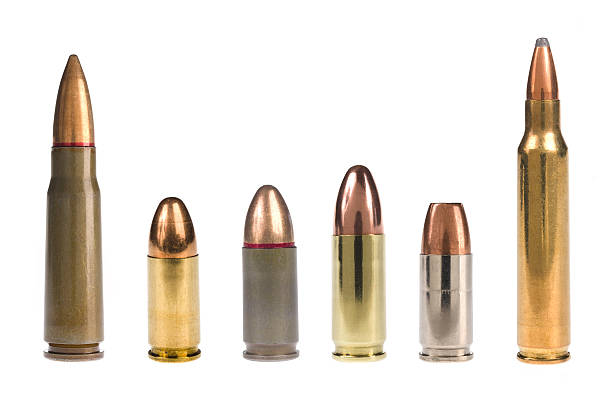Embarking on the journey into the world of firearms can be both exhilarating and overwhelming, especially when faced with the myriad of options regarding bullet calibers. Whether you’re a novice shooter or a seasoned enthusiast, understanding the intricacies of calibers is paramount to making informed decisions about ammunition selection and firearm compatibility. In this comprehensive guide, we’ll unravel the mysteries surrounding bullet calibers, empowering you with the knowledge needed to navigate the diverse landscape of firearms and ammunition with confidence. From demystifying terminology to exploring practical applications, prepare to delve deep into the fascinating realm of bullet calibers.
Demystifying Bullet Calibers: A Comprehensive Guide for Firearms Enthusiasts
When it comes to firearms, understanding bullet calibers is essential knowledge for any enthusiast. Whether you’re a seasoned shooter or just starting your journey into the world of firearms, comprehending the nuances of calibers will not only enhance your shooting experience but also aid in selecting the right firearm for your needs. In this comprehensive guide, we’ll delve into the intricacies of bullet calibers, covering everything from terminology to practical applications.
What is a Bullet Caliber?
In simple terms, a bullet caliber refers to the diameter of the bullet measured in inches or millimeters. It’s a critical aspect of ammunition that determines compatibility with firearms. For example, a caliber of .45 inches means the bullet’s diameter is 0.45 inches. Understanding this fundamental concept is crucial for selecting the appropriate ammunition for your firearm.
Common Caliber Types
Bullet calibers come in various sizes and configurations, each serving different purposes and applications. Some of the most common caliber types include:
- Handgun Calibers: These are typically smaller calibers suitable for handguns and pistols. Examples include .22 LR, 9mm, .40 S&W, and .45 ACP.
- Rifle Calibers: Rifle calibers are larger and more powerful, designed for long-range shooting and hunting. Popular rifle calibers include .223 Remington, .308 Winchester, and .30-06 Springfield.
- Shotgun Gauges: Shotguns use a different measurement system called gauges, with 12 gauge being the most common. Other shotgun gauges include 20 gauge and .410 bore.
Factors to Consider When Choosing a Caliber
Selecting the right caliber for your firearm involves considering several factors, including:
- Intended Use: Determine whether you’ll be using the firearm for self-defense, target shooting, hunting, or competition. Different calibers excel in various applications.
- Recoil: Smaller calibers typically have less recoil, making them more manageable for beginners and those with recoil sensitivity. Larger calibers may offer more power but can be more challenging to control.
- Ammunition Availability: Consider the availability and cost of ammunition for your chosen caliber. Popular calibers like 9mm and .223 Remington are widely available and relatively affordable.
- Terminal Ballistics: Understanding the terminal ballistics of different calibers is crucial, especially for hunters and self-defense practitioners. Research the ballistic performance of various calibers to ensure they meet your requirements.
Specialty Calibers and Magnum Rounds
In addition to standard calibers, there are also specialty calibers and magnum rounds designed for specific purposes. Magnum rounds, such as .357 Magnum and .44 Magnum, offer increased power and velocity compared to their standard counterparts. Specialty calibers, like the .338 Lapua Magnum and .50 BMG, are designed for long-range shooting and extreme precision.
Matching Caliber to Firearm
Once you’ve chosen a caliber, it’s essential to ensure compatibility with your firearm. Most firearms are chambered for specific calibers, indicated by markings on the barrel or receiver. Using the wrong caliber ammunition can result in malfunction or damage to the firearm, so always double-check before loading.
Understanding bullet calibers is a fundamental aspect of firearms knowledge that every enthusiast should grasp. Whether you’re selecting ammunition for target shooting, hunting, or self-defense, choosing the right caliber is crucial for optimal performance and safety. By familiarizing yourself with different caliber types, considering factors like intended use and recoil, and ensuring compatibility with your firearm, you’ll be well-equipped to make informed decisions and enjoy your shooting experiences to the fullest. So, the next time you’re at the range or shopping for ammunition, remember the importance of bullet calibers and choose wisely.
Get Your E3 Firearms Membership Today!
E3 Firearms is more than just a company; we’re a community of educators and firearm lovers.
Empowering You To Discover, Create, Improve and Enjoy Your Best Firearms Lifestyle and Self-Defense Experience. Our organization exists to maximize human potential and accelerate human achievement. We empower people to achieve a higher quality of training, protection and tactically smart life than they ever could without us. Knowledge, success, practical balance, safety, and competence is our business.
It’s about passion, camaraderie, and making memories…
We deliver an eco-environment they can trust and believe in that cuts through all of the uncertainty and noise the industry has become filled with. We endeavor to create a community of confident, highly educated, proficient, and safe professionals and families, thereby not only making a positive impact in their lives, but also being the stewards of the industry to set the standard for the rest of the firearms world to follow.
- Our education is prolific, practical, and thorough.
- Our educators and trainers are world-class.
- Our content and information is thoroughly vetted with best practices.
- Our partners and alliances must be at a high level of quality, standards and integrity.
- Our community is vibrant and connected.
We care deeply about the safety, confidence, abilities, and outcomes of our members. We want them to get the highest quality education while they are personally growing in their own journey. Therefore, we have deployed educational PhD’s, extreme professionals, and developed, well thought out and strategic tracks that our members can benefit from no matter what level they start at.

